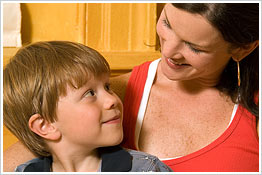Healing the Label of Disability
When her son had problems reading, Amy Sparkman refused to label him as learning disabled. Instead, she turned to God, worked differently with her son, and witnessed a beautiful healing.
By Amy Sparkman
Categories: Health My second son was very slow to read and to speak clearly, and my educational background told me that the public school would put him in remedial classes and want to test him for learning disabilities. I was not comfortable with that – mostly because I saw no reason to label him or to taint his identity at the ripe old age of seven – or ever, for that matter. Here was this pure, good, child of God on the brink of being told he was flawed and lacking. Just as I couldn't find a good reason to force his older brother to alter his highly focused learning style, I could not accept the idea of Noah's unique character being judged and pegged.
 Instead of forcing him to read (he was beginning to resist our "learn to read" sessions together) or to work with a speech therapist, I stopped pushing him and focused instead on reading aloud to him and his brothers – hundreds of books covering history, science, classical literature, stories, folktales, poems. I urged him to talk freely, no matter how the words sounded. Instead of forcing him to read (he was beginning to resist our "learn to read" sessions together) or to work with a speech therapist, I stopped pushing him and focused instead on reading aloud to him and his brothers – hundreds of books covering history, science, classical literature, stories, folktales, poems. I urged him to talk freely, no matter how the words sounded.
Noah didn't read fluently until he was nine, and, even then, his spelling was horrible. But, his speech challenge cleared up completely, and by the time he was ten, he was a voracious reader well beyond his years. Two years into high school, his spelling improved dramatically. He suddenly connected letters to sounds as well as to sight, and spelling took on new meaning. Now a sophomore at Boston University, Noah is majoring in English, earning high marks on all of his written work, and editing for friends.
I prayed specifically and over many years about the reading, speaking and spelling challenges Noah was dealing with. Since I was homeschooling my boys, Noah's challenges loomed large and pointed a finger toward me as the teacher who couldn't solve the problem quickly or easily. And so my prayers evolved to include a greater trust in God to direct our ways – to guide me to do whatever was right, even if it meant sending the children to school. Yet, that option always paled in comparison with what I was learning of God's infinite expression as His children, and of God's infinite resources with which to handle any problem.
I lived with the Bible story of the blind man about whom Jesus said, "Neither hath this man sinned, nor his parents: but that the works of God should be made manifest in him" (John 9:3 KJV). And I often stopped throughout the day to regroup: "Let the words of my mouth, and the meditation of my heart, be acceptable in thy sight" (Ps 19:14).
We had an issue – a learning difficulty – but it gave me the opportunity to say, "OK, how is individuality being expressed, and what am I going to believe about this child – any child? How can there be a limitation to this child of God's creating? If I'm not seeing the fullness of his identity, what am I seeing; what is right here that I can see more fully?" Instead of dwelling on what was lacking, I decided to focus on what was wonderful and rich and good in his character, and to trust that the rest would fall into place. And it did |